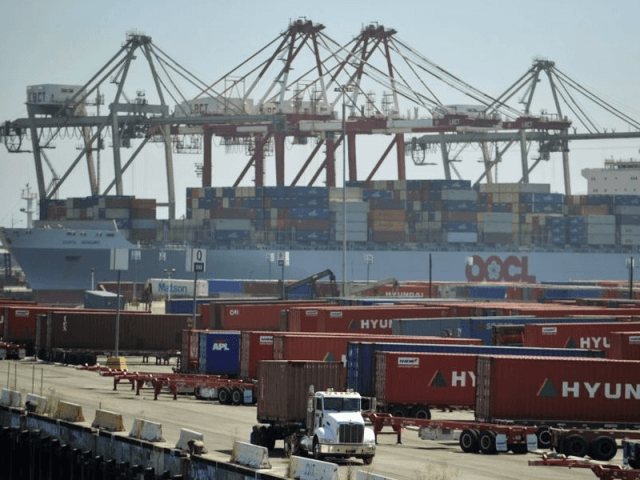Despite the February 21 settlement of a bitter labor dispute at West Coast ports between employers and members of the International Longshore and Warehouse Union (ILWU), whose members command average wages and benefits of about $1,200 a day, the continuing bottleneck is still causing job and revenue losses across many US industries.
Breitbart News had reported that the 13,500 ILWU members’ strategy of withholding of needed crane operators and slowing of crane movements cost shippers and their customers an estimated $1 billion a day during January and February.
The start of the year through early March traditionally is a slow time for international trade, but it tends to be a busy period for certain industries like agricultural exports and building material imports.
For California’s fresh fruit and vegetables producers, losses may never be recovered even after the settlement. Port delays are still running up to eight weeks, which means about 20 percent of this year’s agricultural exports are expected to spoil. Sun Pacific Shippers and Farming, the largest navel orange grower in California and largest kiwi grower in the United States, told the San Francisco Chronicle that port delays will cut their firm’s exports in half this year.
In addition, the bottlenecks at the West Coast ports that caused such horrendous losses pushed back building material imports by at least eight weeks, just as construction demand is accelerating in the spring ramp-up.
With the hot IPO market flooding Silicon Valley and the San Francisco Bay Area with oodles of cash, a number of large trophy office projects had been going-up in the South of Market tech zone. But much of that building has ground to a halt due to protracted delays blamed on the shortage of tempered exterior glass.
Nathan Rundel of the Build Group told CBS San Francisco: “We were all trying to get the cost of these projects less. And so we started to source Chinese curtain wall or overseas curtain wall.” He commented that the hoped-for savings have been more than wiped out by millions of dollars in delays.
According to Rundel, “curtain wall” that serves as the outside skin of most modern high-rises is always custom ordered for the each project. Without glass on the exterior, interior work on the structure cannot begin.
Rundel estimates that a delay could cost him $200,000 a month per building. Fortunately, he ordered glass from a very trusted supplier that took extra steps to get his materials delivered on time. He doesn’t have much sympathy for competitors that went for cheap imported curtain wall, “Their glass has been delayed five, six, seven months. Both from the fact that they went to new vendors and the fact that they can’t get their material.”
But Rundle has lots of sympathy for the construction workers that should be making big money in a record year of work. Due to the continuing bottleneck that is the hang-over from union battle at the ports, hundreds of hard-working laborers are being impoverished.

COMMENTS
Please let us know if you're having issues with commenting.